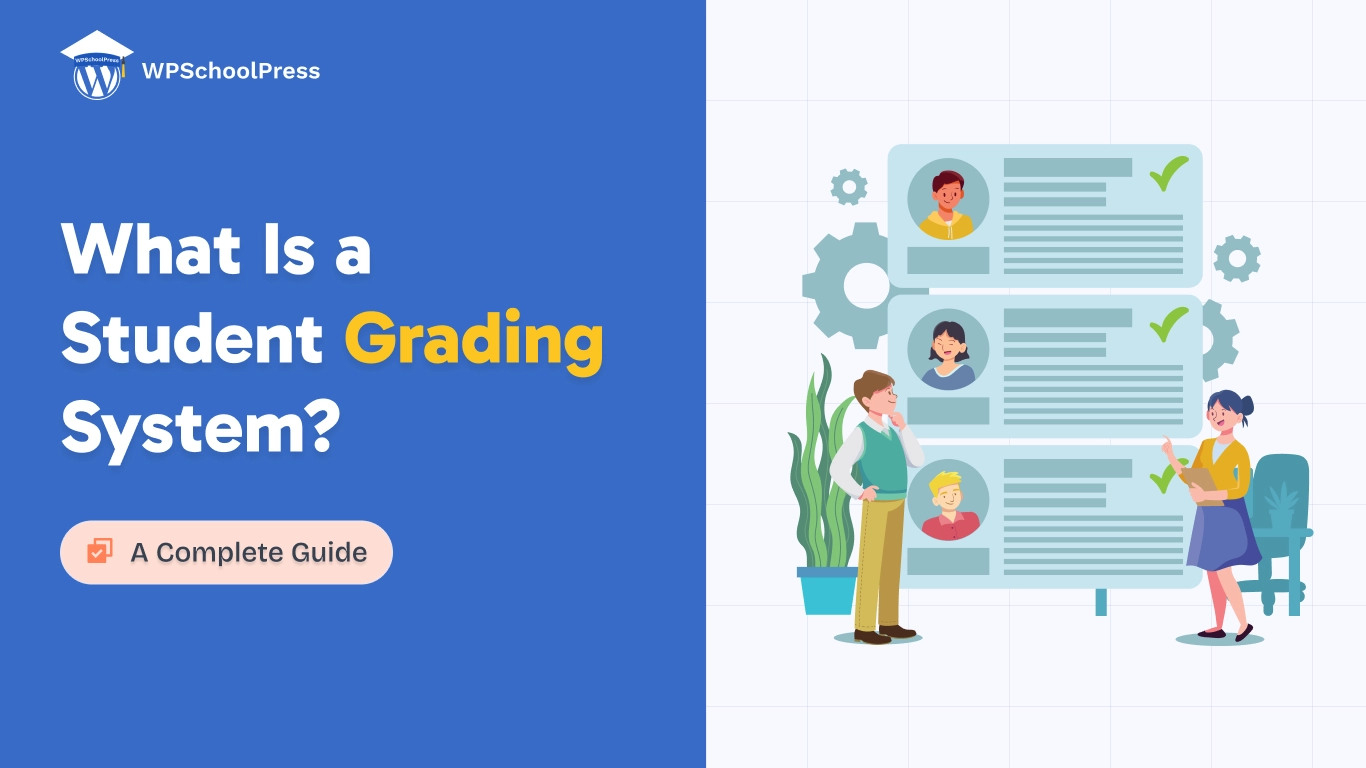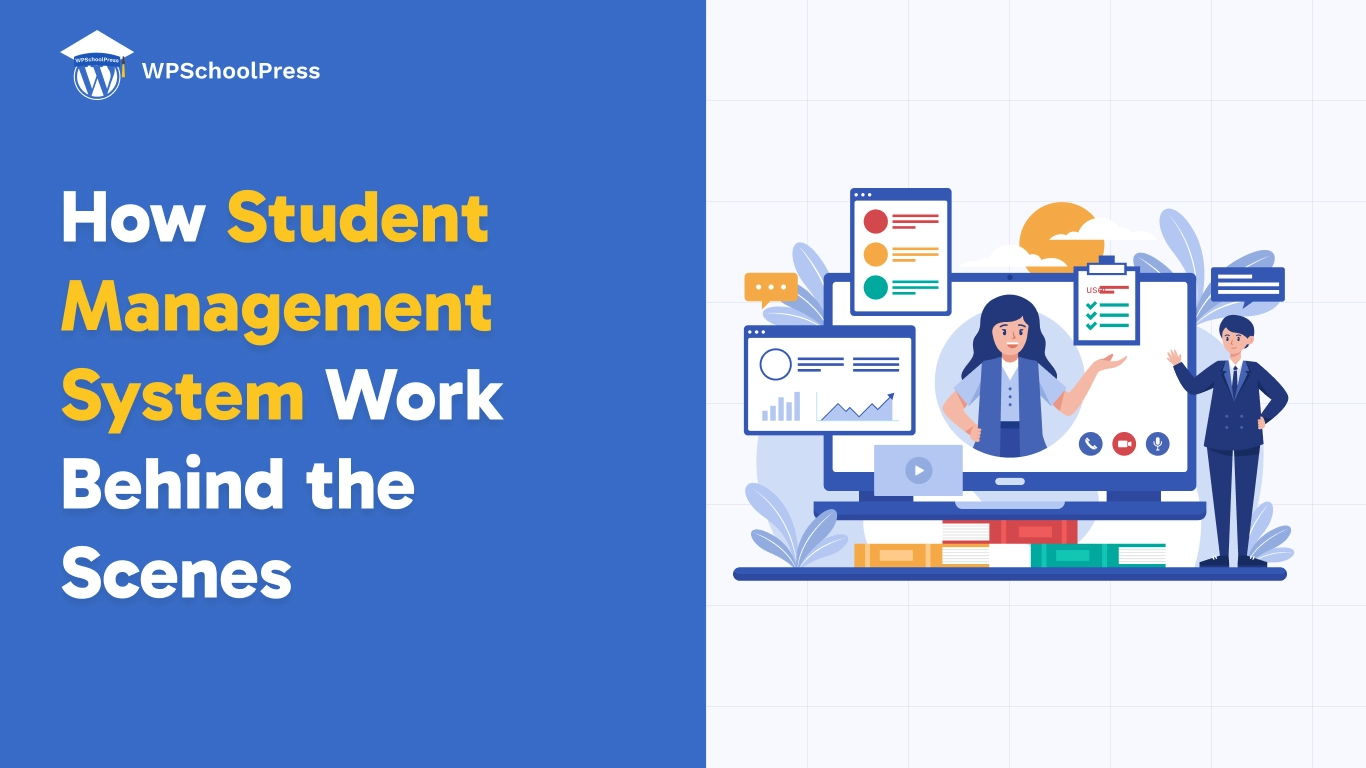Your school’s teachers are already juggling multiple responsibilities. They don’t just trust employees of a school administration. They also have a responsibility to each and every student’s parents.
On top of a full-time job inside the classroom, teachers need to report on student performance and behaviors. Traditionally, this is done through monthly or quarterly parent-teacher conferences, but today’s parents need more.
The more hectic parents’ schedules get, the more actively they worry about their child’s well-being and academic performance. Modern school management software takes a huge burden off of teachers’ and parents’ backs, allowing them to transparently monitor child interaction with teachers, their progress through school, and their attendance.
School administrators use tools like WPSchoolPress to improve parent-teacher communication by cultivating transparent relationships, setting the foundation for trust, address and resolve urgent school matters easily.
Understanding the Importance of Parent-Teacher Communication
The communication between parents and teachers is very strong behind the successful student. However, it’s not just good for letting parents know how their child is faring — it’s also a real plus for the teachers, who are kept in the know about how the students are reading. In the long run, this is good for the student and for each academic performance and well-being in general.
Let’s look at how those issues get in the way of school communication, and how administrators can address those obstacles to encourage teacher involvement and parent satisfaction.
Challenges in Communication Between Teachers and Parents
Despite its importance, communication between teachers and parents isn’t always easy. Some of the common challenges include:
- Language and Cultural Barriers: Differences in language or culture can make it harder to communicate effectively.
- Time Constraints: Busy schedules often make it difficult to find time for communication.
- Miscommunication: Without clear guidelines, misunderstandings can arise, causing frustration on both sides.
By addressing these obstacles, we can foster better parent-teacher communication.
18 Ways to Enhance Communication Between Parents and Teachers
1. Establish Regular Updates Through Emails
Parents get informed in an effective way, which is through emails about important information concerning them. Teachers can email weekly bi-weekly to the parents regarding students’ progress, upcoming events and classroom activities. Parents are always kept updated on what’s going on, and trust is built with them because they know what’s happening.
2. Use a Communication App or Platform
Apps like ClassDojo, Remind, or Seesaw allow for streamlined communication between parents and teachers. These platforms support messages, updates, and even student work, keeping everything organized in one place. Using an app dedicated to classroom communication helps avoid missed messages and strengthens the parent-teacher connection.
3. Schedule Monthly Check-Ins
Setting up monthly or bi-monthly check-ins provides parents with detailed insights into their child’s academic progress. These scheduled touchpoints help teachers share specific updates and give parents a chance to discuss any concerns. Monthly meetings are particularly beneficial for parents who may not be able to attend regular school events.
4. Make Use of Student Portfolios
Parents love portfolios because they allow you to see how your child has grown over time. Teachers can produce digital or physical portfolios of different students’ work, test scores, etc. Very valuable for parents; portfolios provide a visual representation of progress.
5. Encourage Two-Way Communication with Surveys
Opportunity surveys allow parents to speak frankly and give feedback. Using surveys, teachers can find out exactly what parents expect, how they communicate and what they may object to. Collecting feedback can improve communication strategies and make parents feel more involved.
6. Set Up Parent-Teacher Conferences
Parent-teacher conferences are a familiar, classic and effective way to connect with parents. In fact, these conferences provide teachers with a great opportunity to discuss a student in depth regarding academic and social progress. Conferences encourage open conversation and allow both parties to set goals for the child’s success.
7. Provide a Classroom Blog or Website
If you create a classroom blog or website, it’s a no-brainer. This is just a way to build an automated habit in which you can write something every day that parents will have access to on what we’re doing at school. Parents can track down all classroom information in one place, like teachers updating on homework assignments and resources
8. Utilize Social Media for Quick Updates
Sharing reminders and updates quickly and effectively using social media might prove to be a great idea. Finally, through Facebook, Instagram, or Twitter, one can post event announcements, school closures, and classroom achievements. Additionally, students’ personal information should always be handled with the utmost care while managing privacy settings.
9. Offer Translation Services When Needed
In a multicultural world, language barriers should not prevent effective communication. Translation services or bilingual staff can be included from schools to help out in parent-teacher conversations. This ensures every parent has the opportunity to stay involved, regardless of language.
10. Use Progress Reports and Feedback Forms
Parents get to see regular progress reports on how their child has fared academically and leave comments which could provide insight into any concerns on feedback forms. It is one of those two-way exchanges that support such a supportive environment where students can grow.
11. Encourage Involvement in School Events
Inviting parents to school events, such as field trips, sports days, and concerts, lets the parents feel part of the school/community. Activities that engage parents in this type of can then boost the school-home relationship.
12. Conduct Virtual Meetings for Flexibility
Virtual meetings give parents who can’t be here a flexible option. And platforms such as Zoom or Google Meet have made it so simple to schedule virtual parent-teacher conferences, meaning that communication is much more possible than it used to be.
13. Share Educational Resources and Guides
Parents can also receive study guides, educational websites, or learning activities to take up at home. It provides a much-needed boost to parents as partners in their child’s learning journey.
14. Create Clear Communication Policies
Setting communication policies can establish clear expectations. For example, teachers can specify preferred contact methods, response times, and emergency protocols, helping avoid miscommunication.
15. Encourage Parent Volunteer Programs
Parent volunteer programs give parents the opportunity to get involved in school activities by helping with activities as well as helping in the classroom. Volunteer opportunities create a stronger school community and promote parent engagement.
16. Use Visual Communication for Greater Clarity
Visual aids, like infographics or charts, can make complex information more digestible for parents. Visuals are beneficial when explaining academic progress or assessment criteria.
17. Set Up a Suggestion Box for Parents
A suggestion box allows the parents to offer their feedback in a simple way, whether it’s the physical or online box. Gathering insights and improving communication efforts is a great tool.
18. Celebrate Achievements Together
Celebrating student achievements with parents reinforces positive communication and builds excitement around school milestones. These celebrations, big or small, remind parents that their involvement is valued.
Benefits of Teacher and Parent Communication
Transparency Leads to Greater Accountability
A child’s academic results are the result of a team effort. If grades are good, it means teachers are using effective methods to keep their students interested in the subjects, and leading them towards excellence. In turn, teachers and parents alike are motivated by their school administrators. It is your job to think of ways to improve student performance and ways which make parents decide that your school is the best school for their child.
When student performance does not meet expectations, it is not always due to the lack of interest on teachers’ behalf, but often due to a lack of transparency. Parents might receive the news of their child’s poor performance after it has already caught traction and formed a troubling pattern. This moment can be avoided altogether if schools assume greater responsibility for student conduct and performance. Administrators who empower teachers to communicate with parents in a transparent manner help build a solid foundation for student success.
For example, one in six American students is chronically absent. Schools with better channels of communication between teachers and parents are able to reduce chronic absenteeism and keep at-risk students in the classroom.
Frequency is the Basis of Trust
As is the case in any relationship, trust is crucial, but it develops slowly, and its steadiness must be maintained continuously. Teachers should think of themselves as parents’ best friends when it comes to challenging and inspiring their young ones.

Parents need to have the option to check up on their children with the same ease they get from consulting their GPS to get directions to a destination. The more frequently parents have access to academic scores, performance metrics and the behavioral information for their child, the more at ease they will be leaving the fate of their young ones in the school administration’s hands. This will make it more likely that they will give their seal of approval to the school as their child’s second home.
Frequency and consistency in communication will ensure strong compatibility between the school and the parent, one which reassures parents they made the right choice for their child’s education.
Happy Teacher, Happy Parent
In order for kids to excel academically, the well-being of a teacher is equally important as their own. A teacher must feel like caring mentors rather than underappreciated babysitters.
Every parent has concerns they wish to bring up with their child’s teacher, but it is next to impossible to hold a satisfactory one-on-one meeting in increasingly crowded classrooms. Teachers can streamline some of the most important elements of parent-teacher communication. Updates, reminders, and student performance information can be released simultaneously through a simple SMS text that helps teachers deal with every student’s parent in a more pragmatic and efficient manner.
Not only is it important for teachers to relay updates regarding parent concerns, but it is crucial that they do it in a timely manner. If a problem arises, parents have the right to know about it immediately. This involves parents from the start, leading to a more effective solution through effective parent-teacher partnership.
Extracurricular Communication
Parent-teacher conferences can’t address every issue a student may have. Urgent matters can occur in between parent-teacher meetings and must be dealt with through other means. Every school must implement a communication side channel. Phone calls, video calls, emails, texts, can all be utilized for concise and to-the-point updates or reports, rather than releasing a long letter that outlines the general issues, at the beginning of each month.
In today’s hyper-connected, mobile-first world, parents need to feel like they are in the classroom, in the school halls, and close to everything happening in their children’s fast-paced, ever-changing academic and social life. Making information easily accessible and available is just the first step. The next is streamlining the internal structure of the school administration. School administrators need to reduce the barriers between parent and teacher communication.
Parents demand access to student report cards, records compilation, accounts, admission forms, attendance records, and a session calendar. Schools that offer this information in an easy-to-use platform establish themselves as leaders in education. Those that go the extra step can offer personalized SMS messages alerting parents to important developments inside and outside the classroom.
To learn more about how you can make your students’ parents feel more involved and trusting, see our live demo of WPSchoolPress. Empower your school staff to send updates to parents in a transparent, accessible manner through an easy-to-use system.
Conclusion
It creates a collaborative environment in which students can grow; that foundation is building strong communication between parents and teachers. The successful learning of every student, therefore, depends on parents and teachers working together more effectively by implementing these strategies.







